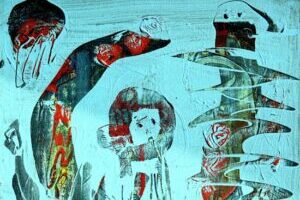From The Natural Child Project/Alice Miller: “When Galileo Galilei in 1613 presented mathematical proof for the Copernican theory that the earth revolved around the sun and not the opposite, it was labeled ‘false and absurd’ by the Church. Galileo was forced to recant and subsequently became blind. Not until three hundred years later did the Church finally decide to give up its illusion and remove his writings from the Index.
Now we find ourselves in a situation similar to that of the Church in Galileo’s time, but for us today much more hangs in the balance. Whether we decide for truth or for illusion will have far more serious consequences for the survival of humanity than was the case in the seventeenth century. For some years now, there has been proof that the devastating effects of the traumatization of children are inescapably thrown back onto society — a fact that we are still forbidden to recognize. This knowledge concerns every single one of us and — if disseminated widely enough — should lead to fundamental changes in our society; above all, to a halt in the blind escalation of violence. The following points are intended to amplify my meaning:
- All children are born to grow, to develop, to live, to love, and to articulate their needs and feelings for their self-protection.
- For their development, children need the respect and protection of adults who take them seriously, love them, and honestly help them to become oriented in the world.
- When these vital needs are frustrated and children are, instead, abused for the sake of adults’ needs by being exploited, beaten, punished, taken advantage of, manipulated, neglected, or deceived without the intervention of any witness, then their integrity will be lastingly impaired.
- The normal reactions to such injury should be anger and pain. Since children in this hurtful kind of environment are forbidden to express their anger, however, and since it would be unbearable to experience their pain all alone, they are compelled to suppress their feelings, repress all memory of the trauma, and idealize those guilty of the abuse. Later they will have no memory of what was done to them.
- Disconnected from the original cause, their feelings of anger, helplessness, despair, longing, anxiety, and pain will find expression in destructive actions against others (criminal behavior, mass murder) or against themselves (drug addiction, alcoholism, prostitution, psychic disorders, suicide).
- If these people become parents, they will then often direct acts of revenge for their mistreatment in childhood against their own children, whom they use as scapegoats. Child abuse is still sanctioned — indeed, held in high regard — in our society as long as it is defined as education [discipline]. It is a tragic fact that parents beat their children in order to escape the emotions stemming from how they were treated by their own parents.
- If mistreated children are not to become criminals or mentally ill, it is essential that at least once in their life they come in contact with a person who knows without any doubt that the environment, not the helpless, battered child, is at fault. In this regard, knowledge or ignorance on the part of society can be instrumental in either saving or destroying a life. Here lies the great opportunity for relatives, social workers, therapists, teachers, doctors, psychiatrists, officials, and nurses to support the child and to believe her or him.
- Till now, society has protected the adult and blamed the victim. It has been abetted in its blindness by theories, still in keeping with the pedagogical principles of our great-grandparents, according to which children are viewed as crafty creatures, dominated by wicked drives, who invent stories and attack their innocent parents or desire them sexually. In reality, children tend to blame themselves for their parents’ cruelty and to absolve the parents, whom they invariably love, of all responsibility.
- Thanks to the use of new therapeutic methods, we are now able empirically to verify that all the repressed traumatic experiences of childhood are stored up in the body and they affect one unconsciously for one’s whole life. In addition, electronic testing of the fetus has revealed a fact previously unknown to most adults — that a child responds to and learns both tenderness and cruelty from the very beginning.
- In the light of this new knowledge, even the most absurd behavior reveals its formerly hidden logic once the traumatic experiences of childhood need no longer remain shrouded in darkness.
- Our sensitization to the cruelty with which children are treated, until now commonly denied, and to the consequences of such treatment will as a matter of course bring to an end the perpetuation of violence from generation to generation.
- People whose integrity has not been damaged in childhood, who were protected, respected, and treated with honesty by their parents, will be — both in their youth and in adulthood — intelligent, responsive, empathic, and highly sensitive. They will take pleasure in life and will not feel any need to kill or even hurt others or themselves. They will use their power to defend themselves, not to attack others. They will not be able to do otherwise than respect and protect those weaker than themselves, including their children, because this is what they have learned from their own experience, and because it is this knowledge (and not the experience of cruelty) that has been stored up inside them from the beginning. It will be inconceivable to such people that earlier generations had to build up a gigantic war industry in order to feel comfortable and safe in this world. Since it will not be their unconscious drive in life to ward off intimidation experienced at a very early age, they will be able to deal with attempts at intimidation in their adult life more rationally and more creatively.”

***
Back to Around the Web











